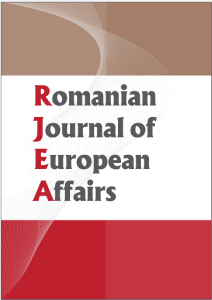Ediția din decembrie a Romanian Journal of European Affairs propune cititorilor săi subiecte recente legate de afacerile europene, cum ar fi: regulamentul privind condiționalitatea ca punct de cotitură în înțelegerea europenizării de către Uniunea Europeană și de Ungaria, semnificația cercetășiei în societatea contemporană (cu un studiu de caz privind statele baltice), economia circulară și ESG, precum și criza migrației și efectele acesteia asupra frontierelor UE după 2015. În plus, numărul actual prezintă analize pe teme legate de agresiunea militară rusă împotriva Ucrainei: predictorii pro- și atitudini anti-ruse manifestate de români la începutul invaziei ruse în Ucraina, impactul conflictului din Ucraina asupra rezilienței și sustenabilității administrației publice locale din România, evoluția diplomației economice a UE în Ucraina și UE ca promotor al democrației în statele Parteneriatului Estic.
The 2022 Conditionality Regulation as a Turning Point in EU’s and Hungary’s understanding of the Europeanisation
Sebastian Kubas
Abstract
The research conducted for this article has explored the controversy between the EU and Hungary surrounding the interpretations of the Europeanisation process: to what extent do they diverge, and to what degree do they converge? Both before and after its 2004 accession to the EU, Hungary has tried to follow the EU’s approach towards liberal democracy. And yet, from 2010 onwards, the state has developed an illiberal political and legal system. This fact revealed a rift between Hungary and the EU. The research questions focused on the problem of the trajectory of the systemic
deterioration of democracy in Hungary, the EU’s reaction to this situation and its decision to apply a conditionality mechanism in 2022. The main hypothesis of this research is that the EU’s reluctance to use more severe sanctioning tools after 2010 has helped Hungary utilise the EU funds to develop an illiberal democratic state which diverges from the EU’s concept of Europeanisation. The research methods we have employed are: the quantitative and the qualitative methods, synthesis and analysis of facts, the comparative method, and the neo-institutional approach. The results and conclusions allow us to state that until 2022, the EU has been unable to force Hungary to obey the rule of law and other liberal democratic principles, though it has made some efforts in this direction. The worsening of the economic situation, after the COVID-19 pandemic and the onset of the war in Ukraine, determined the EU to create a conditionality mechanism that correlates the access to EU subsidies with the observance of the EU rules.
Keywords: Hungary, European Union, conditionality mechanism, European funds.
The Significance of Scouting in Contemporary Society: A Defence Perspective from the Baltic States
Jaroslav Dvorak, Urszula Staśkiewicz
Abstract
The article presents the results of the research into the participation of scouts and scouting associations present in three countries. Three Baltic states (BS) – Lithuania, Latvia and Estonia – have been chosen as the subject of the research. The goal of this paper was to answer the questions of how the scouts perceive their role in the national defensive education system, and what the older scouts want to teach the youth. Based on this, we have attempted an appraisal of whether – and to what degree – scouting organizations contribute to increasing the level of defensive education in a given community. The paper has avoided strictly system-wide solutions, as the latter form a mere backdrop for the results of the research. In order to achieve the goal of the current research, the following research questions were formulated: Does participation in a scouting association represent a form of defensive education? Are the skills obtained from one’s membership in them helping increase the mentioned indicators?
Keywords: Defence, scouts, Baltic states, NGOs, youth.
Predictors of pro- and anti-Russian attitudes displayed by Romanians at the beginning of the Russian military aggression against Ukraine
Alexandru Mihai Ghigiu
Abstract
The Russia-Ukraine war is a disruptive event not only from a geopolitical point of view, but also from a societal perspective because it affects people’s daily lives. For Romania, a bordering country to the Russian-Ukrainian conflagration, the beginning of the war was marked by overwhelming media coverage, anxiety and concerns about the war, as well as polarised attitudes, either supporting or blaming Russia for the conflict. This paper seeks to understand the factors that influenced the Romanian citizens’ stances towards Russia, immediately after the onset of the war. A national survey (N=1006), conducted in April-May 2022, investigated to what extent pro- and anti-Russia attitudes could have been predicted by people’s news consumption habits in that period, by their concerns about the war, by political cynicism and ideology, or by a conspiracy mindset. The findings of the survey show that the concerns about the war influence most people’s attitudes towards Russia. Other significant predictors are doomscrolling (people’s incessant need to check negative news about the war), embracing a conspiracy mindset, political cynicism, and the degree of news consumption. It seems that the high levels of news consumption, especially on social media, lead to increased pro-Russian attitudes.
Keywords: attitudes towards Russia, news consumption habits, concerns about the war in Ukraine, conspiracy mindset, political cynicism.
The Impact of the Ukrainian War on the Resilience and Sustainability of the Local Public Administration in Romania: An Exploratory Study
Dragoș Valentin Dincă, Cristina Elena Nicolescu, Cătălin Daniel Dumitrică, Tatiana-Camelia Dogaru (Cruceanu)
Abstract
This article presents applied-theoretical research, based on a quantitative and qualitative methodology, regarding the institutional transformations produced at the level of a representative sample of local public authorities in Romania, in the context of the armed conflict in Ukraine. Furthermore, this paper highlights the difficulties of meeting the functional requirements (human resources, logistics, etc.) for the proper provision of public services. It proposes a set of recommendations for increasing the administrative capacity of local public authorities in crisis situations in order to ensure their organisational resilience and the sustainability of responses offered to the communities they represent. The article is based on the assumption that the war in Ukraine had a significant impact on the current activities of local public institutions, local budgets, investments, and public procurement procedures. It aims to identify the transformations that occurred at the level of local public institutions in the past year, as well as the nature and size of the impact.
Keywords: Russian-Ukrainian war, impact, local public administration, institutional resilience, sustainability.
The EU’s Evolving Economic Diplomacy in Ukraine and its Ramifications
Oana – Antonia Colibășanu
Abstract
This paper discusses the way the European Union (EU) needs to adapt its economic diplomacy toolbox to tackle current challenges pertaining to the Russian war on Ukraine. It investigates the way in which the EU has developed its economic diplomacy in Ukraine, focusing on the scope of this diplomacy and its efficacy in responding to Russia’s assertiveness and, ultimately, to Russia’s aggression. The research identifies those initiatives that may be part of the priority toolkit used for sustaining the EU’s strategic goals in Ukraine and beyond, considering the evolving global economic environment. The paper concludes with a comprehensive listing of the EU’s challenges and opportunities for further developing its economic diplomacy, including as a solution or a response to the Ukrainian reconstruction needs.
Keywords: EU economic diplomacy, Ukraine’s reconstruction, Ukraine’s war with Russia, Solidarity Lanes, Three Seas Initiative.
Circular Economy and ESG – A European Perspective for Sustainable Development and Mitigation of Climate Change Effects
Florin Bonciu
Abstract
This research presents, from two perspectives (the global perspective and the European Union’s), the urgency of fighting climate change as an essential element for achieving sustainable development. In this context, it explores the synergy between two concepts that are usually approached separately: circular economy and ESG (environmental, social, governance). This synergy and its benefits are set forth in the larger scope of the 2030 strategy of the United Nations for Sustainable Development Goals. Within this framework, an assessment of the EU’s leading role (in supporting and implementing ESG and circular economy) showcases that, in the past quarter century, the European Union has become a supplier of valuable solutions for sustainable development and a catalyst for the rest of the world in the mitigation of climate change effects.
Keywords: climate change, sustainable development, circular economy, ESG, European Union.
JEL classification: O44, Q20, Q54, Q56.
A Missed Window of Opportunity: Migration Crisis and the EU Borders after 2015
Klára Semerádová
Abstract
The article discusses the state of the European Union after 2015, when overlapping crises led to new challenges for the EU, which entailed new political dynamics. As the migration and asylum policy of the Union developed at varying rates and depths, the whole policy became non-symmetrical and hard to coordinate, hence weak in the event of a crisis. This vulnerability was demonstrated during the peak of the 2015 refugee crisis that shook Europe and its security and led to immigration politics and an array of problems. This article is a conceptual paper that addresses a number of issues coming to light after the height of the crisis, including the external border policy, the European identity, concerns about the limitations of the liberal state, the politicisation and securitisation of migration, the framing of immigrants, and the phenomenon of reversing the securitisation of migration, which primarily affected Central and Eastern Europe. The article seeks to answer several questions that highlight the irony of using liberal norms for exclusionary purposes, and the degree to which identity politics and policymaking may progressively transcend and reshape the limitations of the liberal states in Europe.
Keywords: EU, migration, crisis, limitations of the liberal state, mobilisation of nationalism, European identity.
The EU as a Promoter of Democracy in Eastern Partnership Countries
Yaryna Turchyn, Olha Ivasechko and Oleh Tsebenko
Abstract
This article examines the European Union’s role as a promoter of democracy in the countries participating in the EU’s Eastern Partnership (EaP) initiative. Particular attention is paid to those tools used by the EU to promote democracy in the specified countries, namely: political and diplomatic actions, election observation, international cooperation, EU development assistance for effective governance and civil society, sanctions, various platforms and democracy support funds, and financial support. In order to assess the state of democracy in the countries of the EaP, a number of indices were considered, namely: the Freedom House Democracy Index, the Economist Intelligence Unit’s Democracy Index and the Eastern Partnership Integration Index to clarify the correlation between the integration processes of Eastern Partnership countries and the effectiveness of reforms. In addition, the authors used the data of the Normandy Index for 2019-2023, which captures, among others, the state of democratic processes. The research hypothesis states that EU’s influence on the countries of the Eastern Partnership in terms of democratisation is not
always effective, due to both exogenous and endogenous factors. The mechanisms applied by the EU should complement/intensify the internal transformations of the EaP countries that foster democratisation.
Keywords: European Union, Eastern Partnership (EaP), democratic transformation, Democracy index, democratisation.






